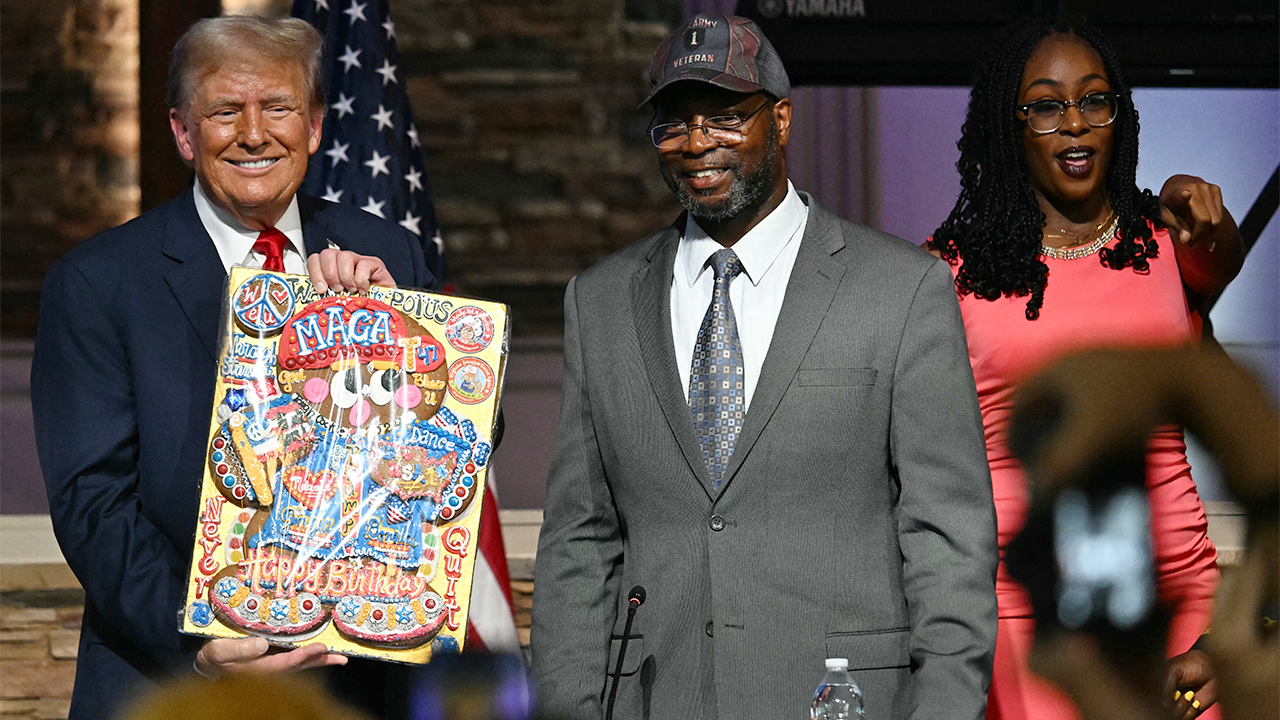Maryland Gov. Wes Moore will issue a mass pardon of more than 175,000 marijuana convictions Monday morning, one of the nation’s most sweeping acts of clemency involving a drug now in widespread recreational use.
Maryland
Gov. Moore vetoes four bills, lets audiologist bill become law without his signature – WTOP News

Press association beats back public notice bill it missed during the 2024 session.
This article was republished with permission from WTOP’s news partners at Maryland Matters. Sign up for Maryland Matters’ free email subscription today.
A bill that would have curbed some public notice advertising revenue for newspapers in Maryland has been vetoed by Gov. Wes Moore (D).
House Bill 1258 was one of four from the 2024 legislative session vetoed by Moore. Two others — identical House and Senate bills expanding the scope of work audiologists can do — were allowed to go into law without the signature of the governor.
All the actions announced Friday were expected.
In vetoing the public notice bill, Moore cited concerns about “ensuring the existence of thriving independent local media.”
HB 1258, sponsored by Del. Elizabeth Embry (D-Baltimore City), would have ended the requirement that public notice on estates be placed in newspapers around the state, allowing them instead to be published on a central website created by the state’s registers of wills.
The bill was overlooked by newspapers and media organizations who have fought off similar bills over the years. Those same groups launched a lobbying effort after the session to secure Moore’s veto.
Rebecca Snyder, executive director of the Maryland-Delaware-DC Press Association, said the veto “underscores Gov. Moore’s acknowledgment of the role of news media and how important our watchdog function is — not only the investigative work that that news media is known for but also the public notice and public records that are a really important way to hold government people in power accountable.
“We understand that this is part of a broader conversation, and we’re willing, certainly, to work with other stakeholders on this. But we are really happy to have seen, kind of, the fruits of our advocacy come to pass,” Snyder said.
The press association, which represents newspapers in the state, said the move would end a practice of independence and transparency. It also would have hit the flagging industry in its pocketbook, a fact noted by Moore.
“The press also plays an important role in public accountability through investigative journalism,” Moore wrote in his veto letter. “Public notice requirements have helped sustain much of the local print media in Maryland as print advertising dollars have dried up and the entire print media industry has consolidated and downsized.
“Many communities in the state now suffer from a lack of press coverage of local news, undermining public accountability. To so rapidly remove such a large source of advertising revenue as estate notices without considering the impact on the future of local media in Maryland could have severe consequences,” he wrote.
Even so, the governor said changes and technology and cost savings for local governments and families should not be ignored. Moore said lawmakers were not given the opportunity to “balance these two significant public interests.”
Supporters said the bill would have saved estates and families money.
Moore agreed. In his veto letter, he said that “existing print public notice requirements do present a financial burden on local and state governments as well as individual citizens.”
“This is the challenge that Delegate Embry was seeking to address,” the letter said.
Moore wrote that the costs to estates are an important concern “and one that should be dealt with.”
Moore vetoes three other bills
Senate Bill 60 would have authorized out-of-state dealers to temporarily display motor homes, recreational vehicles and trailers at shows around the state. The out-of-state dealers could not take orders nor accept deposits under the measure.
The bill also would have required the Department of Commerce to conduct a study on the impact of out-of-state dealers at the Maryland RV show held at the Maryland State Fairgrounds in Timonium.
Sen. Mary Beth Carozza (R-Eastern Shore), lead sponsor of the bill, said the goal was to bolster local RV shows while protecting businesses licensed in the state.
Moore said he rejected the “well-intentioned bill” to protect Maryland jobs.
“Maryland’s recreational vehicle industry is made up of small businesses who employ a total of more than 300 employees statewide,” Moore wrote. “As with many of the small businesses that propel our economy and further opportunities for families in the state, a consistent and reliable marketplace is crucial. Senate Bill 60, as passed, creates a significant and temporary shift in the marketplace for RV dealers with unknown impacts.”
Senate Bill 380 would have created a 21-member workgroup to examine efforts to recruit and retain police officers around the state. Moore vetoed the bill saying it duplicated other efforts.
“It is not necessary to create two workgroups designed to address the same problem,” he wrote.
Senate Bill 693 was identical to a House bill Moore signed May 9, authorizing Carroll County government to borrow $28.9 million through bonds for projects within the county. The governor vetoed the Senate version, saying that “enactment of duplicate bond bills would double authorized debt.”
Audiologist bill becomes law, needs more work
Moore, as expected, allowed identical bills — HB 464 and SB 795 — to become law without his signature.
The bills allow licensed audiologists to diagnose and treat auditory conditions; sell, dispense, and fit hearing aids and external portions of cochlear implant devices; perform ear cleaning; and order blood work and tests as it relates to auditory conditions.
MedChi, the Maryland State Medical Society, opposed the bill that it said “vastly expanded” the work of audiologists.
“I acknowledge and commend the General Assembly, particularly the Finance and Health and Government Operations Committees for their work with advocates to authorize audiologists to practice to the full extent of their training and provide appropriate access to care for Marylanders,” Moore wrote. “However, discussions with proponents and opponents of the bill have made clear that the statute will require further clarification.”
Moore, in his letter, recommended proponents and opponents “collaborate on revisiting these statutes during the interim to ensure that the differences between audiology and otolaryngology are made more clear.”
MedChi CEO Gene Ransom said Friday that his organization “obviously is pleased that Gov. Moore addressed the desire to fix the problem that we identified. We’re looking forward to working with the administration and the General Assembly to make the bill workable.”

Maryland
Maryland governor to pardon 175,000 marijuana convictions in sweeping order

“I’m ecstatic that we have a real opportunity with what I’m signing to right a lot of historical wrongs,” Moore said in an interview. “If you want to be able to create inclusive economic growth, it means you have to start removing these barriers that continue to disproportionately sit on communities of color.”
Moore called the scope of his pardons “the most far-reaching and aggressive” executive action among officials nationwide who have sought to unwind criminal justice inequities with the growing legalization of marijuana. Nine other states and multiple cities have pardoned hundreds of thousands of old marijuana convictions in recent years, according to the National Organization for the Reform of Marijuana Laws. Legalized marijuana markets reap billions in revenue for state governments each year, and polls show public sentiment on the drug has also turned — with more people both embracing cannabis use and repudiating racial disparities exacerbated by the War on Drugs.
The pardons, timed to coincide with Wednesday’s Juneteenth holiday, a day that has come to symbolize the end of slavery in the United States, come from a rising star in the Democratic Party and the lone Black governor of a U.S. state whose ascent is built on the promise to “leave no one behind.”
Derek Liggins, 57, will be among those pardoned Monday, more than 16 years after his last day in prison for possessing and dealing marijuana in the late-1990s. Despite working hard to build a new life after serving time, Liggins said he still loses out on job opportunities and potential income.
“You can’t hold people accountable for possession of marijuana when you’ve got a dispensary on almost every corner,” he said.
Nationwide, according to the ACLU, Black people were more than three times as likely than White people to be arrested for marijuana possession. President Biden in 2022 issued a mass pardon of federal marijuana convictions — a reprieve for roughly 6,500 people — and urged governors to follow suit in states, where the vast majority of marijuana prosecutions take place.
Maryland’s pardon action rivals only Massachusetts, where the governor and an executive council together issued a blanket pardon in March expected to impact hundreds of thousands of people.
But Moore’s pardons appear to stand alone in the impact to communities of color in a state known for having one of the nation’s worst records for disproportionately incarcerating Black people for any crimes. More than 70 percent of the state’s male incarcerated population is Black, according to state data, more than double their proportion in society.
The most diverse state on the East Coast, Maryland has a dramatically higher concentration of Black people compared with other states that have issued broad pardons for marijuana: 33 percent of Maryland’s population is Black, while the next highest is Illinois, with 15 percent.
Maryland is the only state in the D.C. region that has fully legalized cannabis sales, though both the District and Virginia have decriminalized possession and have gray markets for the drug. Virginia and D.C. have not issued mass pardons of cannabis convictions, according to the National Organization for the Reform of Marijuana Laws, but Biden’s pardons had impact in D.C. because they applied to thousands of people arrested on federal land.
Maryland Attorney General Anthony G. Brown (D), called the pardons “certainly long overdue as a nation” and “a racial equity issue.”
“While the pardons will extend to anyone and everyone with a misdemeanor conviction for the possession of marijuana or paraphernalia, this unequivocally, without any doubt or reservation, disproportionately impacts — in a good way — Black and Brown Marylanders,” he said in an interview. “We are arrested and convicted at higher rates for possession and use of marijuana when the rate at which we used it was no different than any other category of people.”
Reducing the state’s mass incarceration disparity has been a chief goal of Moore, Brown and Maryland Public Defender Natasha Dartigue, who are all the first Black people to hold their offices in the state. Brown and Dartigue have launched a prosecutor-defender partnership to study the “the entire continuum of the criminal system,” from stops with law enforcement to reentry, trying to detect all junctures where discretion or bias could influence how justice is applied, and ultimately reform it.
Maryland officials said the pardons, which would also apply to people who are dead, will not result in releasing anyone from incarceration because none are imprisoned. Misdemeanor cannabis charges yield short sentences and prosecutions for misdemeanor criminal possession have stopped, as possessing small amounts of the drug is legal statewide.
Moore’s pardon action will automatically forgive every misdemeanor marijuana possession charge the Maryland judiciary could locate in the state’s electronic court records system, along with every misdemeanor paraphernalia charge tied to use or possession of marijuana. Maryland is the only state to pardon such paraphernalia charges, state officials said.
The electronic records in some Maryland jurisdictions date back to the 1980s, while others begin in the 1990s or later. People with older cannabis convictions stored on paper records may also apply for a pardon.
Demographic data on those pardoned is limited as of Monday.
But Moore’s administration noted nearly a quarter of the pardoned convictions were in Baltimore — a city with a history of unconstitutional over-policing of Black communities — even though less than 10 percent of the state’s population lives there. In the D.C. suburbs, roughly 12 percent of the pardoned convictions are in Prince George’s County, and 6 percent are in Montgomery County.
An ACLU report from 2013 noted that cannabis arrests in states increased nationwide in the first decade of the century, and Maryland and D.C. had among the top five highest arrest rates in the country.
As recently as 2020, according to a state analysis, cannabis arrests in Maryland exceeded 10,000 per year — nearly a decade after possession of small amounts was decriminalized and three years after it became legal to be a medical patient.
As Maryland prepared to legalize the drug for recreational use in 2022 — joining nearly two dozen other states — a report by state analysts found that White Maryland residents use cannabis at higher rates than Black residents, but Black people were more than twice as likely to be charged with possession. By law, 35 percent of the tax revenue generated by legal marijuana sales must go back into communities where cannabis enforcement was disproportionate to the rest of the state.
“The entire basis of the work that we did was about righting injustices from the War on Drugs,” said Del. Jheanelle K. Wilkins (D-Montgomery), chair of the Maryland Legislative Black Caucus. She noted Maryland has newly elevated Black people to key offices of power — the House speaker among them — and said, “We’re in this moment in Maryland where we’re truly focused on equity.”
People who benefit from the mass pardon will see the charges marked in state court records within two weeks, and they will be eliminated from criminal background check databases within 10 months. The convictions, however, will still appear in public court records unless someone applies for an expungement.
Other states have forgone pardons — which forgive the crime — and instead simply blocked cannabis convictions from public view. California, for example, has sealed, dismissed or expunged more than 200,000 convictions since a 2018 law passed requiring it.
The nationwide efforts to lessen the impact of marijuana convictions follow a recent loosening of federal regulations that could clear the way for more widespread access to the drug across the United States.
The Biden administration began working on the issue in 2022, when the president directed health officials to review whether existing science supported reclassifying cannabis so that it would no longer be considered a Schedule I controlled substance, which carries the most stringent restrictions. Other Schedule I drugs include heroin, LSD and ecstasy.
Health officials recommended reclassifying cannabis as a Schedule III drug, which puts it among substances such as Tylenol with codeine, ketamine and anabolic steroids. In April, the Drug Enforcement Administration concurred with federal health officials and Attorney General Merrick Garland officially recommended reclassifying the drug.
Although reclassification does not legalize cannabis federally, it does pave the way for more research on the drug and may broaden access to medical marijuana.
This year for the first time marijuana surpassed alcohol in daily use, with 17.7 million people reporting daily or near-daily marijuana use.
Liggins, who is being pardoned, said he applauds Moore’s forgiveness of marijuana crimes that would not be prosecuted under Maryland’s laws today — even if it wasn’t immediately clear how much this would transform his life.
Shortly after leaving prison in 2008, the Center for Urban Families helped find the job he still holds today with an HVAC construction company in Baltimore. He said his employer trusts him to lead teams on multimillion-dollar projects as a foreman, but Liggins cannot work on the highest-paying contracts with the federal government because of his marijuana convictions. Despite his pardon, Liggins is unsure whether a related charge for providing a false statement will still prevent him from working on those projects.
“A person can change,” he said. “A person should be able to pay their debt to society and start fresh.”
Ovetta Wiggins contributed to this report.
Maryland
DNA evidence from Los Angeles home invasion helps investigators find Maryland murder suspect

Authorities in Maryland tracked down a suspect connected to the 2023 killing of a mother of five with the help of DNA evidence from a home invasion in Los Angeles.
According to the Harford County Sheriff’s Office, Rachel Morin, 37, was found dead one day after going missing on a hiking trail on August 6 of last year. Officials said Morin was attacked and pulled off the trail before being killed.
The case remained unsolved for several months as the suspect escaped the scene, with only sketches released depicting his face.
That all changed on Friday, however, when a man was arrested in Tulsa, Oklahoma on suspicion of murder and rape in connection to Morin’s death.
The turning point in the case, authorities said, was DNA evidence from a March 2023 home invasion in Los Angeles. The alleged killer, 23-year-old Victor Antonio Martinez-Hernandez, is also suspected of attacking a 9-year-old girl and her mother in the L.A. case.
Authorities say Martinez-Hernandez entered the United States illegally in February 2023 from El Salvador. He was identified through the DNA evidence in May, though it took more time to find his location before he was found in Tulsa.
There was no word on when he’ll be extradited to Maryland for a potential criminal trial. No motive is currently known, authorities said.
Maryland
Local Event: Game Time Stand Up Comedy Show at Sully's!

Game Time Comedy presents a night of great stand up comedy featuring nationally-touring headliners Sasha Srbulj and Dan Altano. Also featuring Garrett Harvest.
About Your Comedians
Sasha Srbulj is a standup comedian and creator of the comedy special ‘Artificial Ignorance’ on Amazon Prime. He performs regularly at major clubs in New York, around the US & Internationally. His inspiration is drawn mostly from the feeling of “this can’t be it?!” and that faint notion that buying more crap may not be the path to peace & fulfillment. Sasha has traveled the world and found peace of mind nowhere. Performances in Paris, Barcelona, Los Angeles, and all over New York have done nothing to quench the turmoil of his mind growing like tendrils of curly hair from an ever more confused head. Audiences find the entire process very amusing. You can find his sensibility in the nooks of consciousness where flashes occur like “I shouldn’t be eating this.” & “We elected who?”.
Dan Altano has carved a name for himself in the national comedy scene by narrating his life story with brutal honesty, wit, and heart. Raised in New Jersey, Dan headlines clubs and theaters across the country. Dan’s 2023 Album, Stand-Up Dad, debuted at #1 on the iTunes Comedy Charts and is currently played on constant rotation on Sirius XM radio. Offstage, Dan is the co-host of the podcast Rank It! and is a member of the sketch comedy group Sketch Artists.
Tickets are only $10
-

 Politics1 week ago
Politics1 week agoNewson, Dem leaders try to negotiate Prop 47 reform off California ballots, as GOP wants to let voters decide
-

 World1 week ago
World1 week agoDozens killed near Sudan’s capital as UN warns of soaring displacement
-

 World1 week ago
World1 week ago‘Bloody policies’: Bodies of 11 refugees and migrants recovered off Libya
-

 Politics1 week ago
Politics1 week agoEmbattled Biden border order loaded with loopholes 'to drive a truck through': critics
-

 Politics1 week ago
Politics1 week agoGun group vows to 'defend' Trump's concealed carry license after conviction
-

 Politics7 days ago
Politics7 days agoShould Trump have confidence in his lawyers? Legal experts weigh in
-

 News1 week ago
News1 week agoWould President Biden’s asylum restrictions work? It’s a short-term fix, analysts say
-

 News1 week ago
News1 week agoRead Justice Clarence Thomas’s Financial Disclosures for 2023



















